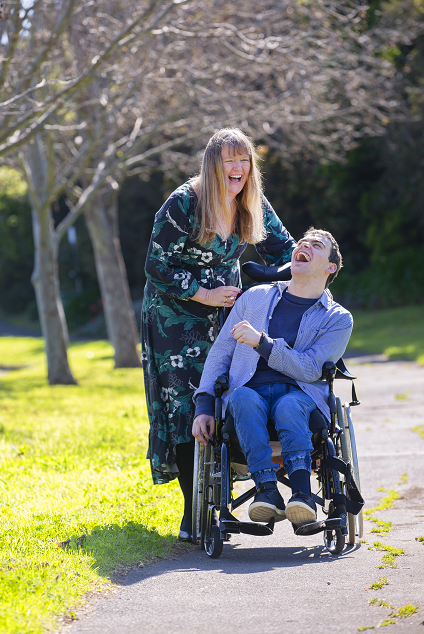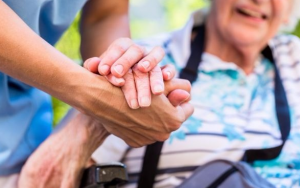From need to care: A real look at Disability Services
From need to care: A real look at Disability Services
Blog Article
The Essential Connection Between Disability Solutions and Effective Home Care Solutions
The relationship in between special needs services and home treatment services is important for enhancing the lives of individuals with specials needs. Impairment services supply necessary resources and support. Home treatment options use individualized aid in familiar atmospheres. This collaboration promotes self-reliance and social inclusion. Yet, the specifics of how these elements engage continue to be complex. Understanding this connection can expose brand-new insights into enhancing take care of those in need. What are the effects for people and caregivers alike?
Understanding Impairment Providers: An Overview
While numerous individuals might not fully comprehend the intricacies of handicap solutions, understanding their extent and relevance is necessary for fostering inclusivity. Disability services include a large range of support devices created to aid individuals with physical, intellectual, or developmental disabilities. These services goal to improve the lifestyle, promoting self-reliance and involvement in culture. They consist of curricula, employment support, transportation help, and healthcare solutions customized to individual needs.Furthermore, these services often include collaboration among various stakeholders, including federal government agencies, non-profit organizations, and neighborhood groups. This collaborative approach warranties that individuals obtain thorough assistance that resolves their distinct obstacles. Recognition of impairment services is vital, as it motivates societal approval and the elimination of stigma. By identifying the relevance of these solutions, areas can create a much more comprehensive setting, ultimately benefiting everyone and promoting level playing fields for individuals with specials needs.
The Role of Home Treatment in Supporting People With Disabilities
Home treatment plays a necessary role in improving the lives of people with disabilities by giving tailored support in familiar environments. This kind of care allows individuals to preserve their self-reliance while receiving aid tailored to their specific demands. Caretakers not just supply physical support, such as aid with daily tasks like showering and meal preparation, but also provide psychological support and companionship.In addition to useful help, home care solutions help with social communication, which is essential for mental wellness. By engaging people in community tasks or assisting in communication with family members and good friends, caregivers assist battle sensations of isolation. Home treatment also eases the concern on household members, permitting them to concentrate on their own responsibilities while ensuring their liked ones receive sufficient treatment (Disability Services Provider). Eventually, home treatment works as a considerable support system, encouraging people with impairments to flourish within their very own homes
Tailored Treatment Plans: Fulfilling Distinct Needs
Customized care plans are vital for successfully dealing with the distinct requirements of individuals with disabilities. These plans are created to provide customized assistance, taking right into account the particular difficulties and choices of each person. By performing extensive analyses, treatment providers can recognize areas and staminas needing help, making sure that care is both pertinent and effective.Incorporating input from the specific and their member of the family cultivates a joint strategy, boosting involvement and satisfaction. Customized treatment strategies may include various services, such as physical treatment, work-related therapy, and personal care assistance, all focused on promoting overall health. Normal examinations of these treatment plans are essential to adapt to transforming conditions and needs. This adaptability permits timely adjustments, ensuring that individuals receive ideal assistance throughout their lives. Eventually, tailored treatment strategies function as a foundation for delivering top quality care that appreciates the dignity and individuality of everyone.
Enhancing Self-reliance Through Handicap Solutions
Encouraging individuals with specials needs to accomplish greater freedom is a key objective of disability services. These solutions offer vital sources that facilitate self-sufficiency and enhance the lifestyle for those impacted. By providing customized assistance, such as movement training, flexible modern technologies, and life abilities advancement, disability solutions allow individuals to navigate day-to-day obstacles much more effectively.Access to community-based programs and social addition campaigns further promotes independence. Through these possibilities, people can engage in purposeful tasks, develop relationships, and establish a sense of belonging. Furthermore, details and reference services help connect people to essential sources, ensuring they get the assistance required to thrive.Ultimately, enhancing self-reliance via impairment solutions not just advantages individuals however also advertises a much more inclusive culture. By breaking down barriers and encouraging self-advocacy, these services empower individuals to lead meeting lives, adding to their neighborhoods in useful methods.
The Value of Training for Caretakers
Training for caretakers is vital for creating crucial skills that directly impact the high quality of care provided to individuals with handicaps. By boosting their knowledge and capacities, caregivers can cultivate thoughtful relationships that promote depend on and understanding. This focus on training not just improves solution distribution however likewise enhances the general caregiving experience.
Necessary Skill Development
Skill development is vital for caretakers in the handicap services and home treatment fields. Appropriate training equips caregivers with the basic skills necessary to provide effective support and aid to people with impairments. This includes understanding details clinical demands, effective interaction strategies, and the ability to react to various behavior challenges. In addition, ability growth improves caregivers' capacity to promote independence in clients, guaranteeing they can perform day-to-day activities with dignity. Recurring training also promotes self-confidence and job satisfaction among caregivers, lowering turnover prices in the industry. By focusing on skill growth, organizations can assure that caregivers are well-prepared to meet the diverse demands of those they serve, inevitably contributing to a much more caring and reliable care atmosphere.
Enhancing Treatment Quality
Boosting the quality of take care of people with impairments depends upon the extensive training provided to caretakers. Well-trained caretakers possess crucial understanding and skills needed to attend to the unique needs of their customers effectively. Extensive training programs incorporate different facets, such as understanding disability-specific difficulties, reliable communication techniques, and security methods. In addition, continuous education and learning warranties that caretakers continue to be updated on best practices and emerging modern technologies in home treatment - Disability Services Provider. This commitment to training not only enhances service delivery but additionally fosters a sense of confidence among caretakers, which translates right into boosted care quality. Eventually, buying caregiver training is important for creating a setting where individuals with disabilities receive the attentive, respectful, and efficient care they should have
Building Compassionate Relationships

Developing a Helpful Setting in the house

Accessible Home Adjustments
Several people with specials needs deal with considerable obstacles in steering their home atmospheres, making accessible home modifications essential for fostering freedom and safety. These alterations can consist of installing ramps, expanding entrances, and developing barrier-free shower rooms, thereby making it possible for easier accessibility throughout the home. In addition, including grab bars and non-slip surfaces can greatly reduce the risk of drops, promoting an extra secure home. Stairlifts or lifts may additionally be necessary for multi-level homes, making sure that all areas are reachable. By implementing these modifications, caretakers can aid produce an atmosphere where individuals can browse their rooms with confidence. Eventually, available home alterations play a crucial role in improving the top quality of life for those with specials needs, allowing them to prosper in their very own homes.
Personalized Treatment Plans
Accessible home alterations lay the foundation for an atmosphere where individuals with disabilities can flourish, however customized support is similarly important. Personalized care strategies play a necessary duty in dealing with the distinct needs of each individual. These plans are developed via Disability Services Provider complete analyses that take into consideration medical needs, individual preferences, and daily routines. By focusing on individual staminas and difficulties, caretakers can produce strategies that cultivate freedom and boost top quality of life. Regular evaluations guarantee that care plans stay reliable and pertinent, permitting changes as demands alter over time. This customized technique not only boosts the experience of those getting care yet likewise promotes a feeling of autonomy, ultimately adding to a much more supportive and equipping home environment.
Family Members Participation Methods
Family participation is vital in establishing a helpful environment for people with impairments at home. Engaging relative in treatment techniques fosters a feeling of belonging and safety and security. Reliable communication is crucial; regular household conferences can assist in conversations about the person's choices and demands. In addition, enlightening member of the family about the certain disabilities can improve understanding and empathy, bring about much better support. Motivating engagement in daily activities not just reinforces connections however also promotes self-reliance for the person. It is essential for households to team up with impairment provider to create cohesive care plans. By proactively entailing relative, a nurturing environment is cultivated, eventually improving the high quality of life for those with specials needs.
Gauging the Influence of Integrated Treatment Solutions
The performance of incorporated care remedies can greatly influence the lifestyle for individuals with disabilities. Measuring this effect needs a diverse technique that includes different metrics, including health and wellness results, customer satisfaction, and cost-effectiveness. Health outcomes can be assessed by tracking renovations in flexibility, psychological health, and overall health, giving substantial proof of care effectiveness. Individual complete satisfaction surveys can record the experiences of people and their households, providing insights into the perceived top quality of treatment received. In addition, assessing cost-effectiveness assists to ensure that resources are being utilized successfully, permitting sustainable treatment designs. By employing these measurement strategies, stakeholders can get a detailed understanding of exactly how integrated treatment solutions positively impact individuals with impairments. Eventually, this information not only aids in refining existing solutions but additionally notifies future plan choices, making sure that care continues to be aligned with the advancing demands of this population.
Regularly Asked Concerns
How Can Family Members Advocate for Better Handicap Solutions and Home Treatment?
Families can support for improved handicap services and home care by looking into resources, attending community conferences, engaging with local agents, sharing personal experiences, developing support teams, and teaming up with organizations dedicated to impairment rights and care improvements.
What Are Usual Misunderstandings Concerning Impairment Services and Home Treatment?

Are There Financial Assistance Options for Special Needs Services and Home Care?
Economic assistance choices for disability services and home care consist of federal government programs, grants, and insurance policy protection. Resources differ by place, calling for individuals to research study local companies and companies that supply financial backing tailored to their demands.
How Can Innovation Improve Home Look After Individuals With Disabilities?
Innovation can boost home take care of individuals with impairments by supplying assistive tools, telehealth services, and keeping see it here track of systems. These innovations improve availability, advertise freedom, and enable caregivers to respond more effectively to the needs of their clients.
What Resources Are Offered for Caregivers of Individuals With Disabilities?
Numerous sources exist for caretakers of people with handicaps, consisting of federal government assistance programs, support system, instructional workshops, on-line discussion forums, and specialized training. These sources intend to boost caretakers' skills and provide practical and emotional assistance. The partnership in between impairment services and home care solutions is vital for boosting the lives of people with handicaps. Home treatment additionally relieves the worry on household participants, enabling them to focus on their very own duties while guaranteeing their loved ones receive adequate treatment. By performing thorough analyses, treatment carriers can recognize staminas and areas needing assistance, guaranteeing that treatment is both effective.incorporating and relevant input from the private and their family members promotes a joint strategy, improving interaction and complete satisfaction. Customized treatment strategies may include various services, such as physical treatment, work-related treatment, and individual treatment aid, all aimed at promoting overall health. Innovation can boost home treatment for individuals with impairments by providing assistive gadgets, telehealth solutions, and keeping track of systems.
Report this page